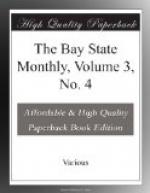“The temptation is too great to resist,” I responded, after a moment’s reflection, “and I accept with pleasure.”
A week later I alighted from Christopher Gault’s carriage at the door of a beautiful summer cottage, not a mile from where my vacation had been spent in ’79. His own groom led the horse to the stable, and Mrs. Gault met us on the veranda. She welcomed me in her charming manner, making a pleasant allusion as she did so to our first meeting as attorney and client. We chatted pleasantly for a half hour, when a bell announced that dinner was ready, and we repaired to the dining-room, where a meal was served, simply, but most tastefully. “Now,” said Mr. Gault, as we rose from the table, “perhaps you have in mind the promised explanation of my rather precipitate departure from this attractive region some time ago; and, if Mrs. Gault will excuse us, we will take a little walk.
“You will remember,” he began, as we walked leisurely down the well-shaded path in the narrow country road, “that two years ago I showed to you a picture of a lady whom we have just left. You also remember that, while I gave you to understand that we were strongly attached to each other, I was very far from being enthusiastic about it as a young lover might be. You did not know the reason then, but it was simply a question of blood.
“In the year 1795 flagrant act of treason was committed against the Government of Great Britain and His Majesty King George III. My great-grandfather was then a large property holder, not far from London, and he figured prominently in public affairs.
“Although he had always been of irreproachable character, trusted and respected, yet the circumstances were such that suspicion was turned towards him. A certain officer in the king’s army appeared and declared himself ready to testify as a witness to treasonable acts and words on the part of my great-grandfather. A warrant was issued for his arrest, and the process was about to be served when it was discovered that he had fled. Then his house was searched, and in it was found strong corroborative evidence. This was nothing less than letters, which, if genuine, proved without the shadow of doubt that he was guilty. There was no one to appear in defence of the accused, and he was convicted. As he was not to be found within the king’s domains, judgment of outlawry was pronounced against him as a fugitive from justice. Then followed those dreadful attendant penalties; confiscation of his estate and the terrible ‘attainder and corruption of blood.’ His only son was in America at the time, and, disgraced and with prospects blighted by the news of his father’s downfall, he resolved never to return. Twelve years ago this son’s youngest daughter, my beloved mother, died, leaving me with little else than barely means enough to finish my education, and a good amount of ambition.




